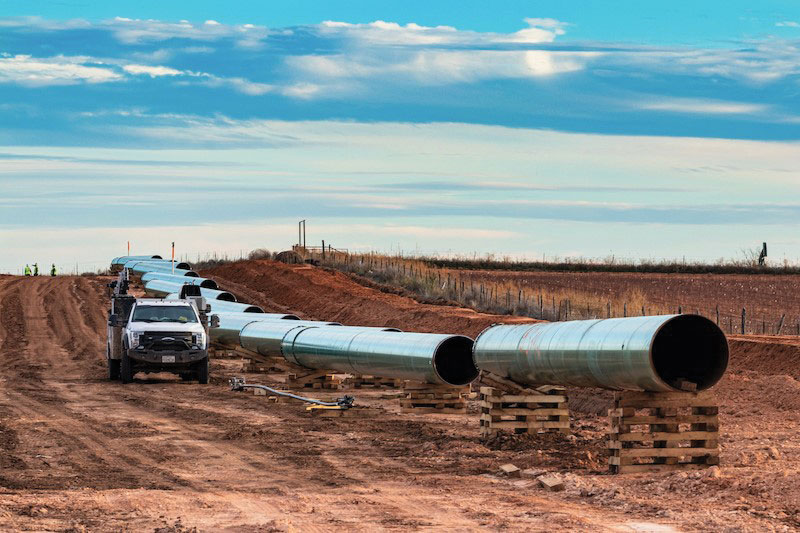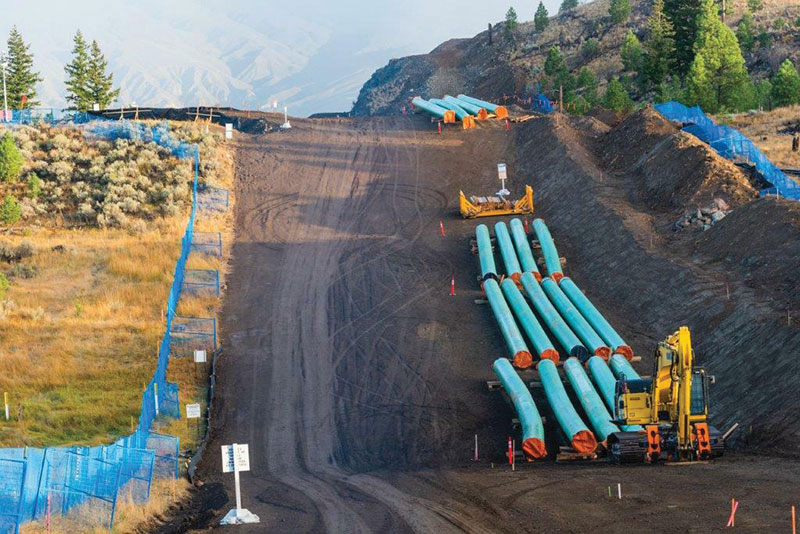July 2022, Vol. 249, No. 7
Projects
Nigeria On Board with Morocco-to-Europe Gas Pipeline
Vaca Muerta Gas Pipeline Targets 25% Capacity Growth
The Argentine government began a tender process before building a new gas pipeline from the 308-Tcf (8.72-Tcm) Vaca Muerta shale formation. The project will increase current transport capacity by 25%, the government announced.
The 350-mile (563-km) pipeline will connect the province of Neuquen with Salliquelo, an area west of Buenos Aires, and it is expected to take 18 months to complete once construction is underway.
The estimated cost of the project is $1.5 billion. Argentina is taking on this project as part of an effort to overcome its major energy deficit and bring in foreign money from gas exports.
The Vaca Muerta shale formation is the world’s fourth-largest shale oil reserve and the second largest for shale gas.
Much-Delayed Iran-Oman Pipeline Project Back on Track
Iran’s oil minister has agreed to revive a long-stalled project to lay an undersea pipeline to carry gas to Oman, the Iranian state news agency IRNA said.
Iran sits on one of the world’s largest gas reserves, which Oman has been eyeing because it hopes to feed energy-intensive industries and liquefied natural gas (LNG) export plants.
IRNA said the agreement to revive the project was reached during a trip to Oman by Iranian Oil Minister Javad Owji, ahead of an official visit to the Gulf Arab state by Iranian President Ebrahim Raisi.
In 2013, the two countries signed a deal, valued at $60 billion over 25 years, for Iran to supply gas to Oman through an undersea pipeline. In 2016, the two countries renewed efforts to implement the project, and Iran said in 2017 that it had agreed with Oman to change the route of the planned pipeline to avoid waters controlled by the United Arab Emirates.
The project was subsequently delayed by price disagreements and U.S. pressure on Oman to find other suppliers before the U.S. withdrew from a 2015 nuclear deal between world powers and Iran, and reimposed sanctions in 2018.
Tehran and Washington have held indirect talks in Vienna over the past year to revive the nuclear agreement, which led to the lifting of sanctions, but the negotiations have stalled.
105-Mile Genesis Deep-Water Pipeline Expected by 2025
Genesis Energy will spend about $500 million over the next three years to increase its footprint in deep-water Gulf of Mexico by expanding a pipeline system and building a new line, according to a first-quarter earnings report.
The Cameron Highway Oil Pipeline System (CHOPS), which transports oil from deep-water oilfields to markets on the Texas Gulf Coast will be enhanced with a new 105-mile (169-km) pipeline called SYNC.
Genesis recently entered into agreements to transport the crude from two deep-water developments with a total production capacity of about 160,000 bpd.
Production of oil from both deep-water developments is expected in late 2024 or 2025.
UGI to Fully Fund for RNG Projects in South Dakota
UGI Energy Services (UGIES) and MBL Bioenergy have agreed to fund the first set of renewable natural gas (RNG) projects currently under development in South Dakota.
The project will represent over $70 million of investment by MBL Bioenergy, with UGIES providing 100% of the funds. MBL Bioenergy is a joint-venture partnership between UGIES, Sevana Bioenergy and a subsidiary of California Bioenergy (CalBio) with the sole purpose of developing RNG projects in South Dakota.
The first set of projects, known as a cluster, will be built at three farms located north of Sioux Falls, South Dakota. It is expected to generate 300 MMcf (8.50 MMcm) of RNG annually once completed in calendar year 2024.
Dairy waste from the farms will be anaerobically digested and then piped to a central upgrading facility before it is delivered into the interstate natural gas system near Dell Rapids, South Dakota. UGIES, through its wholly owned subsidiary, GHI Energy, will be the exclusive marketer for MBL Bioenergy.
Nigeria On Board with Morocco-to-Europe Gas Pipeline
A new gas pipeline from Africa to Europe moved closer to reality after Nigeria gave the go-ahead to its state oil firm NNPC to sign a memorandum of understanding with West African regional body Commission of the Economic Community of West African States (ECOWAS).
Nigeria and Morocco signed a joint venture in 2016 to construct the pipeline, which will carry gas to 15 West African countries and through Morocco to Spain and Europe, Timipre Sylva, Nigeria Minister of State for Petroleum Resources, said at a cabinet meeting in Abuja while presenting the request for approval.
“We are still at the front-end engineering design,” Sylva said, according to Reuters. The cost and funding of the pipeline have not been determined. Neither has a construction schedule.
The agreement came as African gas supplies to Europe grow in importance with the Ukraine crisis, casting doubt on Russian energy exports. Algeria has already agreed to raise its supply to Italy.
Nigeria and Morocco said last year that the pipeline will be 3,517 miles (5,660 km), and construction will be in phases covering 25 years. They have launched feasibility studies with a plan to build the pipeline both onshore and offshore.
The project, which has been touted as conducive to economic integration in West Africa, would also add to the network of existing gas pipelines carrying supplies to Europe via the Mediterranean Sea.
Tallgrass Making Natural Gas Pipeline Part of CO2 System
Tallgrass Energy said it will convert a natural gas pipeline into carbon dioxide (CO2) service, and ship CO2 from an Archer-Daniels-Midland Co. corn-processing plant in Nebraska to a permanent underground storage hub in Wyoming.
The Trailblazer natural gas pipeline, which runs through Nebraska, Colorado and Wyoming, will become a 400-mile (644-km) CO2 system with the capacity to transport more than 10 million tons of CO2 per year.
The pipeline will connect to Tallgrass’s CO2 sequestration hub in eastern Wyoming, which is expected to begin service in 2024.
In most states the permitting of underground carbon injection wells can take years because of federal requirements.
Wyoming and North Dakota both hold enforcement authority over the permitting of such facilities, which allows them to speed up the process.
Alberta
Alberta Premier Boost Oil Pipeline Expansion, More Exportation
Canada could add over a million barrels per day of oil export capacity to the United States over the next two years, according to Alberta Premier Jason Kenney.
Speaking before the U.S. Senate Energy and Natural Resources Committee, he urged lawmakers to look into building a cross-border oil pipeline that would help ensure U.S. energy security, in the wake of Russia’s invasion of Ukraine.
The Canadian government has previously said it could increase oil exports via pipeline by 300,000 bpd by the end of this year.
Kenney, according to Reuters, said an additional 200,000 bpd could be shipped south by rail, while technical improvements from midstream companies could add as much as 400,000 bpd of capacity by next year.
The government-owned Trans Mountain Expansion Project is also scheduled to be finished late next year, and it will add nearly 600,000 bpd, he said.
Croatia Looks at Option of Increasing Adriatic Oil Pipeline Capacity
Croatia may increase the Adriatic oil pipeline capacity to Hungary and Slovakia to circumvent disruptions to imports from Russia via the Druzhba pipeline, Hungary’s foreign minister said.
The European Union agreed to concessions for Hungary, thereby bolstering a policy to cut 90% of Russia’s crude imports by the end of the year.
According to Reuters, Hungarian Foreign Minister Peter Szijjarto reached a long-term energy security cooperation agreement with Croatia’s energy minister, for an alternative route for possible additional oil imports, if needed.
“Croatia is ready to provide a route for oil shipments towards Hungary, should they become necessary,” Szijjarto said, adding that talks with Croatia would begin soon.
Gas Pipeline Maintenance Delayed to Secure Supply
Finland and the Baltic states’ gas transmission system operators decided to postpone summer maintenance on the Balticconnector pipeline, Gasgrid Finland said.
The pipeline, which connects Finland with Estonia, has become a key source of energy supply for Finnish companies, following Russia’s announcement in May that it would cut deliveries to Finland.
The city of Imatra was, prior May 21, the entry point for Russian gas into Finland, and the decision to postpone the Balticconnector maintenance as scheduled was caused by disruption at that point, the official added.
Summer capacity on Balticconnector has been restored to normal levels, according to an Estonian government official.
Court Rejects Effort to Block Loans for Australian Pipeline
A South Korean court dismissed an application from a group of Indigenous Australians to block South Korean export credit agencies from funding a deep-sea gas pipeline for the $3.6 billion Barossa gas project off northern Australia.
The Seoul Central District Court dismissed the application to block loans to the project worth about $700 million, the court’s record showed.
The Indigenous groups had said they were not properly consulted on the Barossa project and the planned162-mile (260-km) pipeline that will connect offshore gas facilities to an existing pipeline that runs to Darwin.
People from the Tiwi Islands and Larrakia Traditional Owners in March sought an injunction from the Seoul Central District Court to block Export-Import Bank of Korea (KEXIM) and Korea Trade Insurance Corp. (K-Sure) from providing loans for the Barossa pipeline.
Bosnian Retaining Gazprom Gas Supplies Through 2022
Bosnia’s major gas importer Energoinvest extended a deal on gas supplies with Russia’s Gazprom until the end of the year under unchanged conditions.
Energoinvest signed an annex to its contract with Gazprom, under which the price for gas will be corrected on a quarterly basis as was already the case, based on the nine-month change in the price of oil derivatives, according to Reuters.
The Balkan relies on Russian supply for 400 MMcm (14 Bcf) of gas per year and has been receiving gas from Gazprom since the start of 2021 via the TurkStream pipeline and a new route crossing Turkey and Bulgaria.
“The signing of this annex enables a continued free supplying of the Federation of Bosnia-Herzegovina with natural gas until Jan. 1, 2023, when the signing of the new annex of the contract is scheduled,” the company said in a statement.
Bosnia is made up of the Federation dominated by Bosnians and Croats and the Serb-dominated Serb Republic, with the former the main gas consumer. Bosnia has no reserves of gas, which accounts for up to 8% of its energy use.
In April, the Federation government increased the price of natural gas for the second quarter by 21.7% following a price rise by Gazprom.







Comments